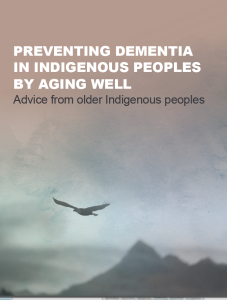Fact sheet from the Indigenous Cognition & Aging Awareness Research Exchange (I-CAARE.ca) in Canada based on research with Canadian indigenous communities.
Each factsheet has a blank space to add your own organization’s contact information. Factsheets have pages in multiples of four so they can be printed on regular paper or as a booklet.
Preventing Dementia in Indigenous Peoples by Aging Well: Advice from Older Indigenous Peoples
Fact Sheet Excerpt
Healthy Body – Healthy Mind
“You gotta keep active”
Adults who are physically active through sports, regular exercise, walking and outdoor activities are at a lower risk for dementia.
Some ways to keep your mind healthy as you age are to:

Take care of your heart
• Use and challenge your mind
• Keep your body active – moving regularly
• Maintain good relationships with family and friends – visiting
• Eat good healthy foods
SOME EXAMPLES:
Many older Indigenous adults kept their minds and bodies active by reading, working on puzzles, crafting, listening to or playing music, gardening, hunting and fishing, as well as walking in the bush or around town and going for bicycle rides. They warned about watching too much television or being lonely.
Indigenous people also talked about participating in ceremonies, church and community events as good opportunities to keep active, get out in the community and visit with others.
Take care of your body
Healthy aging means treating your body well. This includes maintaining good personal hygiene, getting enough sleep and eating healthy foods, including lots of vegetables and fruits. Some people feel that foods from their own gardens or from the land are best for your health. Try to stay away from processed foods and soft drinks.
We need to be careful what we put into our bodies. For our brains to stay healthy, we need to limit how much alcohol we drink and be careful with prescription drugs. If you have questions about your prescriptions or need help with alcohol or drug dependency, you need to talk to a health care worker or someone you trust to help.
Some people talked about the importance of ceremonies to help keep their mind, body and spirit in balance. Try to take time each day to care for you physical, mental, emotional and spiritual needs.
Stay connected
To nature and community
Maintaining strong and positive relationships with your communities and family can have positive impacts on healthy brain aging.
Older Indigenous adults talked about the importance of visiting with their families, friends and other community members to prevent loneliness. Find opportunities in your community that honours Elders’ roles to help you stay connected.
